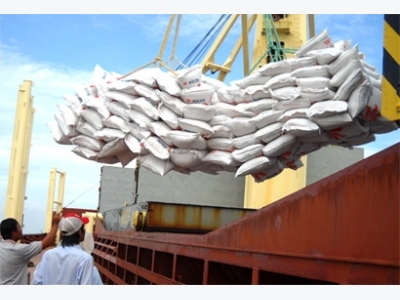CIEM suggests amending Decree 109 on rice export

HANOI – The Central Institute for Economic Management (CIEM) has proposed the Government scrap unreasonable conditions on rice export in Decree 109/2010/ND-CP and replace them with quality conditions for each rice species.
Firstly, the Government should give small-scale enterprises a green light to export their own rice of high quality in small quantities, facilitating them to penetrate demanding and choosy markets, CIEM said in its report entitled “Challenges in the development of Vietnam’s rice value chain.”
Secondly, the Government should not directly participate in government-to-government contracts but to assist enterprises in their direct negotiations by offering market information, predicting rice prices, and accessing international distribution channels. The current rice export mechanism dictated by the Vietnam Food Association (VFA) and State-owned enterprises (SOEs) has had an adverse effect on the rice value chain.
Thirdly, it is necessary to equitize SOEs and remove VFA’s monopolistic power. VFA should not have the right to decide on rice export and distribute benefits to its member enterprises. Besides, VFA should be equally represented by all stakeholders in the chain, especially rice producers.
Stringent regulations in the Government’s Decree 109 have eroded the competitiveness of the rice export sector. To get a certificate for rice export, enterprises are required to have at least one warehouse with a minimum capacity of 5,000 tons, and a milling facility with a minimum hourly processing capacity of 10 tons, and to have exported rice for 12 consecutive months.
There were over 200 rice exporters before the decree took affect but the current number is reduced to 145 enterprises, according to the VFA.
CIEM says the regulation has made the VFA hold a monopoly position in rice export and create barriers to healthy competition among rice exporters.
Article 17 of the decree prescribes enterprises must register with the VFA within three working days after their rice export contracts are clinched. This means they must submit copies of their contracts that mention their export rice prices and available amount of rice.
The VFA has the right to request local departments of trade and industry to check the reported amount of rice which may cause difficulties in enterprises’ rice export activities. Besides, rice export traders must report on the progress of their contracts with the VFA.
CIEM says the current legal regulations are creating unfair advantages for SOEs to export rice. This seems to run counter to the 2013 Constitution, prescribing participants in various economic sectors are equal.
SOEs currently account for a high proportion of rice export shipments, thanks to government-to-government or so-called centralized contracts. These contracts are usually assigned to the VFA for the management and distribution to its own members.
Meanwhile, SOEs like the Vietnam Northern Food Corp. and the Vietnam Southern Food Corp. are VFA’s leading companies, and their leaders are also VFA’s leaders. These enterprises are mainly involved in the final stages of export activities and rely heavily on intergovernmental contracts.
Related news
 Mekong Delta expands farm land toward large-scale production
Mekong Delta expands farm land toward large-scale production Land concentration toward large-scale commodity production is one of the main objectives of Vietnam’s agriculture restructuring.
 Vietnam's Jan-April rice exports fall to 9-year low - govt
Vietnam's Jan-April rice exports fall to 9-year low - govt Despite falling shipments and a smaller crop, Vietnamese rice prices remained stable over the past month and were cheaper than Thai rice.
 Vietnam to chop pork imports in mission to save pig farmers' bacon
Vietnam to chop pork imports in mission to save pig farmers' bacon Vietnam plans to cut pork imports and expand export markets for the meat as part of an unprecedented nationwide campaign to rescue pig farmers